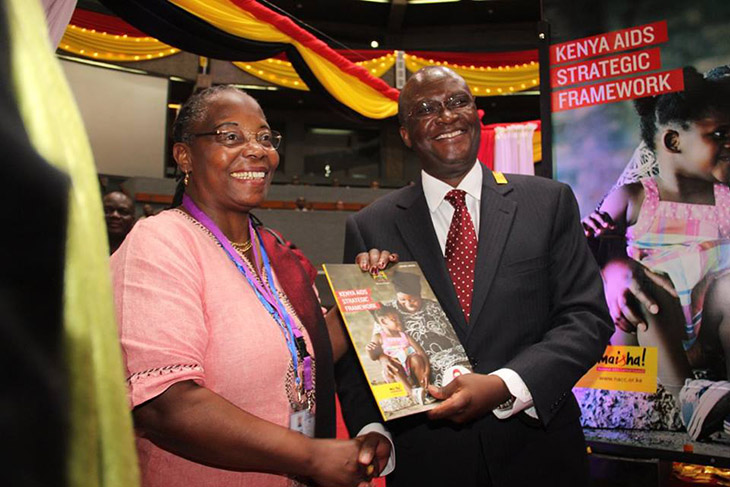The Health Policy Project ended in 2016. Work continued under Health Policy Plus (HP+) until 2022.
NEWS & VIEWS

The Kenya Cabinet Secretary for Health, Mr James Macharia, and the World Health Organisation Kenya Representative, Dr Custodia Mandlhate, at the launch in Nairobi. Photo courtesy of the National AIDS Control Council.
NAIROBI, Kenya—On November 28, 2014, the Ministry of Health, through the National AIDS Control Council (NACC) launched the Kenya HIV and AIDS Strategic Framework 2014/15-2018/19 (KASF), developed in collaboration with a variety of stakeholders including the USAID-funded Health Policy Project (HPP). KASF will act as the primary document guiding the country’s HIV response for the next five years.
Unlike past iterations of the strategic plan, the KASF transforms Kenya’s HIV response, guiding county governments in the development of their own strategic plans; plans that will directly address the unique needs of their citizens. Commenting on the new strategic framework, Tom Oneko of HPP observed, “When you break down the plan to the counties you get more targeted interventions. It gives power to the counties and, in turn, to the people.”
Kenya’s new policy also breaks from past plans by explicitly advocating for a human rights approach in HIV and AIDS programming; putting in place responsive policy and legal reforms for key populations and people living with HIV; strengthening the integration of communities and health systems; and ensuring a sustainable and accountable HIV response. In a revolutionary move, the framework examines the various policy- and non-policy-related factors that often impede HIV control efforts. As HPP’s Tom Oneko explains, “There is a new thinking. Past plans have been implemented and guided by medical interventions. The new strategic plan takes it a step further…to understand what needs to be done for biomedical interventions to reach their full impact we need to understand the social, cultural, economic, and political impediments to HIV programming. If we do that we’ll be able to understand what the key drivers are, how to reach both general and key populations, and how to ensure key populations are able to access services.”
Many of the additions to Kenya’s HIV response grew out of a collaboration between NACC, the Kenya National AIDS & STI Control Programme (NASCOP), and HPP. The Health Policy Project participated in and provided oversight of the task force charged with crafting the policy and provided key information for the development of the framework. For instance, various HPP initiatives informed the KASF, primarily the Kenya Policy Analysis and Advocacy Decision Model (DM) for HIV-Related Services and a study exploring the social feasibility of HIV programs in Kenya. Both of these documents guided groundbreaking social inclusion and human rights sections of the KASF.
HPP also helped to redefine Kenya’s approach to HIV financing. By examining efficiency gains HPP was able to provide the government with data on which HIV interventions were the most cost-effective to include in the policy, what the estimated gaps in funding would be, and the total resources Kenya would need over the five year implementation period. In light of declines in HIV funding from the international donor community, the costing data also highlighted for Kenya the need to increase domestic financing of its HIV response.
Speaking at the official launch of the strategic framework, Ms. Regina Ombam, Head of Strategy Development for NACC, commented, “Although the continuing growth of the pandemic is sobering, with support of our partners, I know as a country we have the ability to bring it under control- with more and better service, smarter public policy, more efficient and effective programs, adequate funding and strategies for addressing the blind spots in the existing efforts. My sincere gratitude goes to USAID (HPP) in supporting the NACC in the development of the KASF…This strategic framework, which we are launching today is a true spirit of togetherness in the Kenyan people’s desire for change, governance, accountability, citizen participation, [and] democracy in the HIV response.”
What's New
- Something to Build On: “Innovation Exchange” Celebrates the Health Policy Project’s Close and a New Beginning
- What Will it Take for Tanzania to Achieve ART Targets and Ensure Long-Term Sustainability of the HIV Response?
- Helping Kenya’s County Leaders Advocate for Increased Health Investments
- HPP Holds Working Meeting on Ensuring Responsible PEPFAR Transitions for Key Populations
- Health Policy Project Celebrates 2016 International Women's Day
- HPP Staff Participate in White House Conference on HIV Stigma Reduction

